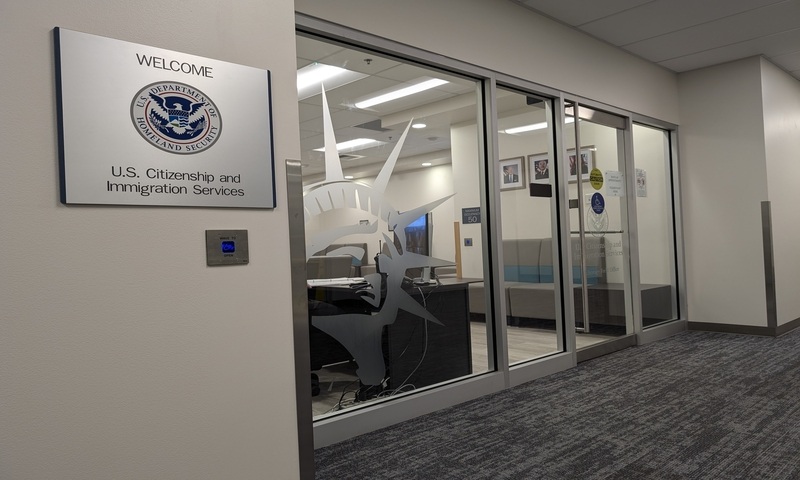US Citizenship and Immigration Services (USCIS) has enacted an immediate update to its Policy Manual, instructing its officers to give overwhelmingly negative weight to perceived “anti-American” activities when adjudicating certain immigration benefit requests. The new guidance, which also expands social media vetting, will directly impact applications requiring a “discretionary analysis,” a component of the decision-making process for benefits such as adjustment of status, parole, and certain employment-based visas.
According to the agency, the update clarifies and reinforces existing policy, emphasizing that an applicant’s support for anti-American ideologies, antisemitism, or terrorist organizations will be a significant negative factor.
“US Citizenship and Immigration Services is committed to implementing policies and procedures that root out anti-Americanism and supporting the enforcement of rigorous screening and vetting measures to the fullest extent possible,” said USCIS spokesman Matthew Tragesser in a statement. “Immigration benefits—including to live and work in the United States—remain a privilege, not a right.”
The guidance applies to all requests that are pending or were filed on or after the publication date.
Understanding Discretionary Analysis
For many immigration benefits, applicants must not only meet baseline eligibility requirements but also prove that they merit a favorable exercise of discretion. This discretionary analysis is a separate adjudicative step where an officer weighs positive factors (such as family ties in the US, community involvement, and compliance with immigration laws) against negative factors (like criminal history, immigration violations, or misrepresentation).
The updated policy explicitly directs officers to consider endorsement, promotion, or support for anti-American ideologies as a heavily weighted negative factor in this balancing test. While the press release references Section 313(a) of the Immigration and Nationality Act (INA) for definitions of anti-American activities, that section specifically pertains to prohibitions on naturalizing individuals who are anarchists or advocate for the overthrow of the U.S. government or support totalitarian regimes. The application of this concept to a broader range of non-naturalization benefit requests represents a significant policy clarification.
The changes are detailed in Volumes 1, 2, 7, and 10 of the USCIS Policy Manual, which governs the agency’s adjudications.
Implications for Employment Visa Holders and Families
The policy update has significant implications for individuals on employment-based non-immigrant visas, such as the H-1B for specialty occupations, H-2B for temporary non-agricultural work, and J-1 for exchange visitors, as well as their families. Many of these individuals may eventually apply for an adjustment of status to permanent residency (a “Green Card”), a process that requires a favorable discretionary finding.
The most direct impact will come from the expansion of social media vetting. Under the new guidance, social media activity will be more rigorously scrutinized for content that could be interpreted as “anti-American.” This could include:
- Public Posts and Comments: Statements, memes, or articles shared that are critical of US government policy or institutions.
- Group Memberships: Affiliation with online groups that advocate for causes or ideologies deemed anti-American or in opposition to US foreign policy.
- Likes and Shares: Endorsement of content from individuals or organizations that the US government considers hostile.
For visa holders and applicants, this means that public-facing online activity could become evidence in their immigration proceedings. Legal experts note that the term “anti-American” is not clearly defined in the INA for this broad context, creating potential ambiguity for both applicants and the officers reviewing their cases. This could lead to inconsistent application of the standard, where an officer’s subjective interpretation of an applicant’s political views or online expression could result in a denial. Families of principal applicants could also face scrutiny, as their activities might be considered as part of the overall “totality of the circumstances.”
The guidance also specifically clarifies that discretion is exercised in adjudicating requests for an extension of stay and change of status, which directly affects nonimmigrants like H-1B and J-1 visa holders who must periodically renew their legal status.
Historical Context and Precedent
The use of ideological criteria for exclusion from the United States is not new. US immigration law has a long history of barring individuals based on their political beliefs and associations.
The Page Act of 1875 and the Chinese Exclusion Act of 1882 were early laws that used broad criteria to exclude specific national groups.
In 1903, anarchists were explicitly added to the list of excludable individuals following the assassination of President William McKinley.
During the “Red Scare” of the 1950s, the McCarran-Walter Act of 1952 was enacted to bar communists and others deemed subversive from entering the country or naturalizing.
While many of these explicit ideological grounds for exclusion have been softened over time, the current policy update revives the focus on an applicant’s beliefs and expressions as a central element of immigration adjudication, albeit within the framework of discretionary analysis rather than statutory ineligibility.
The policy alert also addresses specific employment-based categories. It clarifies that in the adjudication of an Immigrant Petition for Alien Workers (Form I-140), the exercise of discretion is generally limited to cases where the applicant is seeking a National Interest Waiver (NIW). This waiver allows certain advanced-degree professionals or individuals of exceptional ability to bypass the traditional labor certification process if their work is deemed in the US national interest.
Furthermore, the guidance specifies how discretion applies to the EB-5 Immigrant Investor Program. Adjudicators will apply discretionary analysis in EB-5 cases involving threats to the national interest, fraud, misrepresentation, or criminal misuse. This appears to be a move to strengthen integrity measures within the program.
USCIS Anchorage field office in Alaska. Photo credit: USCIS/Facebook.




Facebook Comments